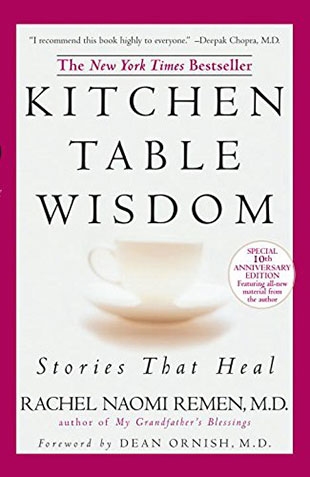"Everybody is a story. When I was a child, people sat around kitchen tables and told their stories. We don't do that so much anymore. Sitting around the table telling stories is not just a way of passing time. It is the way the wisdom gets passed along. The stuff that helps us to live a life worth remembering. Despite the awesome powers of technology many of us still do not live very well. We may need to listen to each other's stories once again.
"Most of the stories we are told now are written by novelists and screenwriters, acted out by actors and actresses, stories that have beginnings and endings, stories that are not real. The stories we can tell each other have no beginning and ending. They are a front-row seat to the real experience. Even though they may have happened in a different time or place they have a familiar feel. In some way they are about us, too.
"Real stories take time. We stopped telling stories when we started to lose that sort of time, pausing time, reflecting time, wondering time. Life rushes us along and few people are strong enough to stop on their own. Most often, something unforeseen stops us and it is only then we have the time to take a seat at life's kitchen table. To know our own story and tell it. To listen to other people's stories. To remember that the real world is made of just such stories.
"Until we stop ourselves or, more often, have been stopped, we hope to put certain of life's events 'behind us' and get on with our living. After we stop we see that certain of life's issues will be with us for as long as we live. We will pass through them again and again, each time with a new story, each time with a greater understanding, until they become indistinguishable from our blessings and our wisdom. It's the way life teaches us how to live.
"When we haven't the time to listen to each other's stories we seek out experts to tell us how to live. The less time we send together at the kitchen table, the more how-to books appear in the stores and on our bookshelves. But reading such books is a very different thing than listening to someone's lived experience. Because we have stopped listening to each other we may even have forgotten how to listen, stopped learning how to recognize meaning and fill ourselves from the ordinary events of our lives. We have become solitary; readers and watchers rather than shares and participants.
"The kitchen table is a level playing field. Everyone's story matter. The wisdom in the story of the most educated and powerful person is often not greater than the wisdom in the story of a child, and the life of a child can teach us as much as the life of a sage.
"Most parents know the importance of telling children their own story, over and over again, so that they come to know in the telling who they are and to whom they belong. At the kitchen table we do this for each other. Hidden in all stories in the One story. The more we listen, the clearer that Story becomes. Our true identity, who we are, why we are here, what sustains us, is in this story. The stories at every kitchen table are about the same things, stories of owning, having and losing, stories of sex, of power, of pain, of wounding, of courage, hope, and healing, of loneliness and the end of loneliness. Stories about God.
"In telling them, we are telling each other the human story. Stories that touch us in this place of common humanness awaken us and weave us together as a family once again.
"Sometimes when I ask people to tell me their story they tell me about their achievements, what they have acquired or built over a lifetime. So many of us do not know our own story. A story about who we are, not about what we have done. About what we have faced to build what we have built, what we have drawn upon and risked to do it, what we have felt, thought, feared, and discovered though the events of our lives. The real story that belongs to us alone.
"All real stories are true. Sometimes when a patient tells me their story, someone in their family will protest. 'But it didn't happen quite that way, it happened more like this.' Over the years I have come to know that the stories both these people tell me are equally true, equally genuine, and that neither of them may be 'correct,' an exact description of the event much as a video camera might have recorded it. Stories are someone's experience of the events of their life, they are not the events themselves. Most of us experience the same event very differently. We have seen it in our own unique way and the story we tell has more than a bit of ourselves in it. Truth is highly subjective.
"All stories ware full of bias and uniqueness, they mix fact with meaning. This is the root of their power. Stories allow us to see something familiar through new eyes. We become in that moment a guest in someone else's life, and together with them sit at the feet of their teacher. The meaning we may draw from someone's story may be different from the meaning they themselves have drawn. No matter. Facts bring us to knowledge, but stories lead to wisdom.
"The best stories have many meanings; their meaning changes as our capacity to understand and appreciate meaning grows. Revisiting such stories over the years, one wonders how one could not have seen their present meaning all along, all the time unaware of what meaning a furture reading may hold. Like the stories themselves, all these meanings are true."
